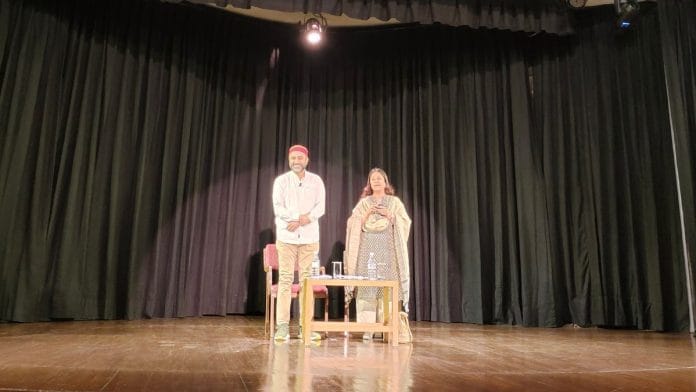New Delhi: When one thinks of legendary actor Dilip Kumar, one film and two actors definitely come to mind: Mughal-e-Azam, Madhubala, and Saira Banu. What most seem to miss is his father’s disappointment with his chosen career. Kumar’s father had lofty dreams for him, but not in the world of cinema. He was disappointed when his actor son, born as Muhammad Yusuf Khan, took on his screen name.
This lesser-heard story took centre stage during the second performance of director Yaqub Ghauri and playwright Sadia Rahman’s 60-minute theatre voice presentation, Kuch Kahi Kuch Ankahi.
The theatrical reading featured lyrical dialogues interspersed with lively narration. Seated beside each other on a well-lit stage, Ghauri and Rahman voiced all characters of the narrative, building off of each other’s energy.
The CD Deshmukh Auditorium at India International Centre (IIC) was packed with about 100 audience members, most of them elderly, eager to hear their beloved star’s life story. “We came because we belong to that generation,” said Asha Gambhir, who was out on a ‘nostalgic trip’ with two friends.
Ghauri began the story with the arrival of cinema in pre-Independence India. At the time, Kumar’s father, Lala Ghulam Sarwar Khan—called Aghaji by his children—lived in Peshawar’s Qissa Khwani Bazaar — a ‘Market of Storytellers’. He was a fruit merchant who wished his son to be a learned member of society, earning a marker of class that surpassed mere wealth.
Aghaji wanted his son to enrol in the civil services and earn the Most Excellent Order of the British Empire (OBE), a high honour during the British Raj.
In Ghauri’s narrative, Aghaji saw cinema as a degeneration of social values and the traditional way of telling a story as a dastaan or a qissa. When Prithviraj Kapoor, son of his neighbour Dewan Basheswarnath Singh Kapoor—who possessed the much-desired OBE badge—took up acting, he voiced his disappointment frankly.
As luck would have it, World War II forced Aghaji to relocate his family to Bombay, home to one of the busiest film industries around.
Also read: Dilip Kumar was the First Khan of Bollywood, the Prince Salim of our hearts: Shobhaa De
From Yusuf to Dilip
Kumar didn’t have a lifelong dream of becoming an actor; he wanted to pursue soccer. But he was handsome, charming, and well-spoken, and the industry found its way to him. Ghauri and Rahman enacted an amusing exchange between a young Kumar and Raj Kapoor that hinted at what was to come.
“O laale, tussi bade handsome ho, actor ban jao (My friend, you’re very handsome, become an actor),” read out Ghauri as Raj Kapoor.
“Are dialogues kaun bolega? Bataur tumhare main toh aisa ghabraata hoon ki bolna bhool jaata hoon (Who will say the lines? As you like to remind me, I get so scared that I forget to speak)!”
“Main tennu train kar diyanga; ye soch ki Aghaji kya kahenge (I could train you, but think what Aghaji will say)!”
Cut off from Peshawar after Partition, Aghaji quietly endured the loss of his homeland and his business suffered the loss of their fruit gardens. It was up to Kumar to handle the family’s finances.
When he ran into well-known psychologist Dr Masrani at Churchgate Railway Station and told him that he was looking for a job, he didn’t expect to be carried off to Bombay Talkies for an interview with producer Devika Rani. Ghauri used a sher to describe how Rani couldn’t take her eyes off him, having spotted a diamond in the rough.
“Bataur mir mahaul kuchh aisa tha ki woh aaye bazm mein itna toh Mir ne dekha, phir uske baad chiragon mein roshni na rahi (It so happened that they walked into the gathering, and after that there was no longer light in the lamps),” Ghauri recited, and the audience broke out into an appreciative, “Kya baat!”
“Urdu jaante ho (Do you know Urdu)?” Rani asked Dilip Kumar.
“Ji (Yes),” replied Kumar.
“Actor banoge (Will you become an actor)?”
“Nahi (No),” he exclaimed, explaining that he had only ever watched one film—a war documentary—and that he knew nothing about acting.
Rani assured Kumar that he could learn to act on the job, offering him a monthly salary of Rs 1,250. At a time when Raj, son of star Prithviraj Kapoor, earned Rs 175 per month, this figure was astounding. It was the solution to his family’s financial problems and a more lucrative opportunity than Kumar would ever get.
As is widely known, he signed a contract with Bombay Talkies and Devika Rani gave him his screen name, Dilip Kumar.
Also read: When Dilip Kumar, Meena Kumari played Romans in Bimal Roy’s 1958 film Yahudi
An ache in heart
Kumar kept his acting career a secret from Aghaji for four years. It was Dewan Kapoor who pointed his father to a poster of Jugnu (1947), exposing Kumar. Enraged, the father stopped talking to his son entirely, going about his day as if Kumar didn’t exist.
Rahman narrated that Aghaji did eventually resume talking to Kumar, but their relationship was never the same. When his dream died, it took some of the love for his son with it.
Rahman was drawn to the story because she gathered from Kumar’s autobiography, Dilip Kumar: The Substance and the Shadow, that he didn’t seem to think of himself as successful despite being one of the most successful actors of his time.
“There was an ache in his heart about not having completed his father’s wish. So, no one is complete in this world,” Rahman told ThePrint.
(Edited by Aamaan Alam Khan)






